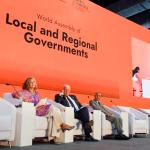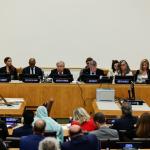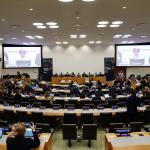The fourth Towards the localization of the SDGs report was presented in the occasion of the Local and Regional Governments’ Day in the framework of the 2020 High-Level Political Forum. The report builds on the previous publications’ knowledge on the state of localization, and has adapted to the current context by emphasizing the direct contribution of local and regional governments both to the SDGs and to the COVID-19 crisis.
The report also reviews the diversity and the breadth of local initiatives implemented by cities and territories to improve human wellbeing through the defense of human rights, public services and adequate housing, celebrating initiatives to reduce gender inequalities and protect cultural diversity. It underlines the myriad of local innovations to fight against climate change and protect our environment. It shows how local and regional governments can lead local economic development and contribute to addressing the current economic recession.
“This report shows that our voices are increasingly being heard. For the first time, local and regional governments have been asked to participate in more than half of the VNRs being submitted, and we are seeing more and more recognition of our very own Voluntary Local and Subnational Reviews” Jan Van Zanen, Mayor of the Hague.
The report underlines the role that Local and Regional Governments (LRGs) are playing in the frontline of the COVID-19 response, keeping people safe and delivering basic services. The context created by the pandemic has opened a window for structural change, and states that it is critical to consolidate the policies carried out by local and regional governments during the pandemic, fortifying basic services, and ensuring that the recovery packages in the aftermath have local communities at the core. Accelerating governance reforms to ensure that the potential of LRG actions is harnessed is one of the critical issues to be addressed to ensure an inclusive recovery.
The actions of local and regional governments on reducing poverty, delivering basic services, and achieving the SDGs are, however, still insufficient. The fourth report of our constituency to the HLPF underlines the need to strengthen the mobilization of resources and capacity building for local and regional governments to overcome the current crisis, and to promote the transformation of financial ecosystems to boost urban and territorial governance.
Regarding local and regional involvement in the monitoring and reporting process, Towards the Localization of the SDGs shows how the tide for the localization of the SDGs is growing over the years. Local and regional governments’ involvement in VNR processes has increased to 55% in 2020, up from 42% in the 2016-2019 period. The report points to an increase in the elaboration of Voluntary Local Reviews and Voluntary Subnational Reviews, with a number of countries facilitating this process and including the results in their own national reviews. They also recognize the relevance of local and regional government networks as facilitators, even if there is still work to be done.
Our report to the High-Level Political Forum finally lays out some critical recommendations for the way forward, among which:
- Empower local and regional governments to trigger structural change and thus accelerate the achievement of the 2030 Agenda. If properly empowered, the innovative policies displayed by LRGs that can be consolidated into the long-term strategies that can fulfill the SDGs.
- Continue the efforts to galvanize forces for the localization of the SDGs in cities and territories. The movement for localization needs to continue, during the pandemic and into the recovery, to ensure the new context fosters the innovative policies championed by LRGs.
- Advocate for strong national localization strategies of the SDGs that include robust localization policies and support LRGs.
- Create an enabling institutional environment for localization and ensure adequate financing flows to support localization, which is more urgent than ever to ensure the capacity of LRGs and all stakeholders to act in favor of the SDGs.
- Involve all spheres of government, the civil society and key stakeholders as a critical step to strengthen the governance of the SDGs and the localization process. Strong partnerships and the participation of LRGs, the civil society, the private sector, social partners and academia in national SDG coordination mechanisms, and also in the definition, follow-up and monitoring of the SDGs, are critical to achieve the whole-of-government and whole-of-society approaches to achieve the goals.
- Strengthen LRGs’ voices in voluntary national reporting to achieve a qualitative leap in SDG implementation. Despite the progress observed, the pace at which this process has advanced has been insufficient and needs to be accelerated.
- Acknowledge, support and promote bottom-up monitoring and localized indicators fed with disaggregated data. National and local capacities to define and collect disaggregated and localized data should be part of the SDG localization strategies to ensure that planning processes at all levels are founded on realistic targets and that effective implementation can be monitored.
- Strengthen global cooperation through a renewed and reinforced multilateral system. As global challenges become more complex, interconnected and pressing, reinforcing global cooperation and solidarity through the revitalization of a multilateral system that speaks to local communities and the civil society becomes an increasingly urgent necessity. LRGs have demonstrated that they play a key role building bridges between local communities and global institutions.
Our report ends with the reinstatement of our commitment to achieve the universal development agendas, accelerate the SDG implementation/localization and consider our common vision for 2030 to rebuild our societies. Our solidarity, cooperation and commitment will be essential to ensure a world that leaves no-one and no place behind.
Further information:
- Read our Fourth “Towards the localization of the SDGs” report here
- Read our Statement to the High-Level Political Forum
- Read an account of the Local and Regional Governments’ Day here
- Read the IISD coverage of the Local and Regional Governements' Day




